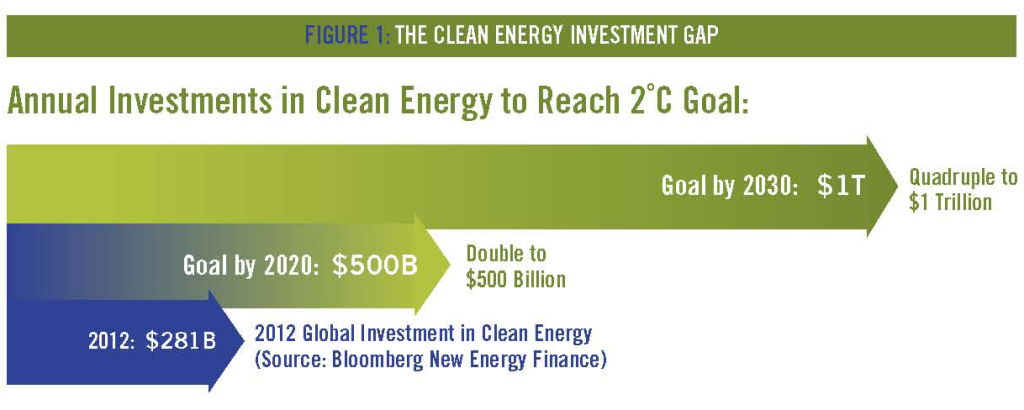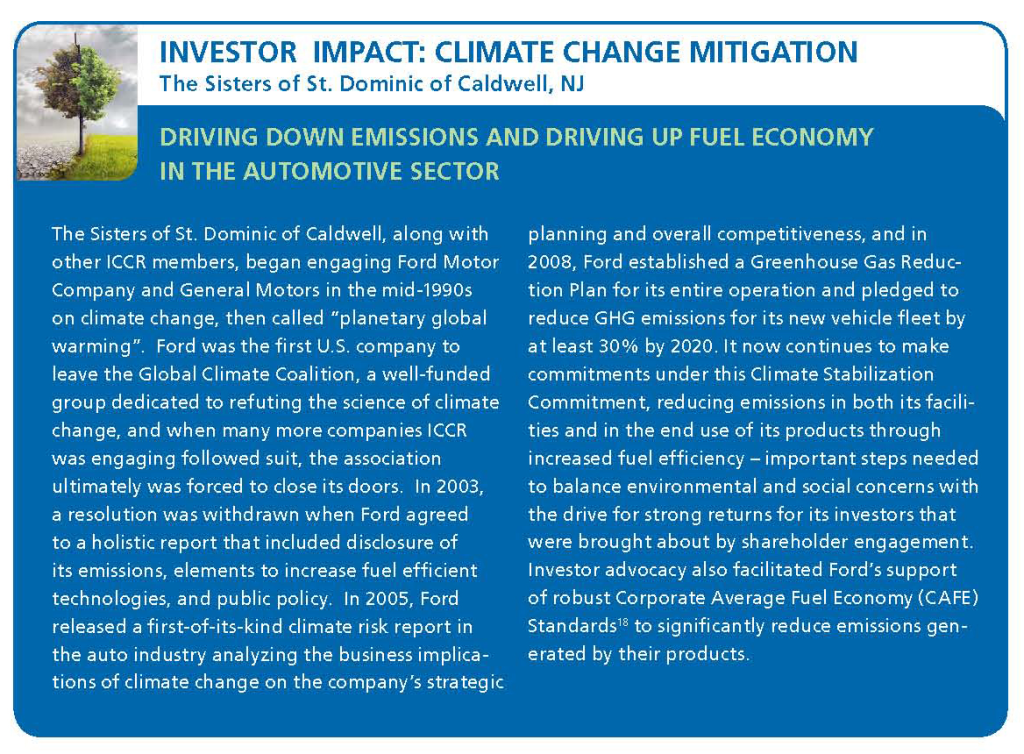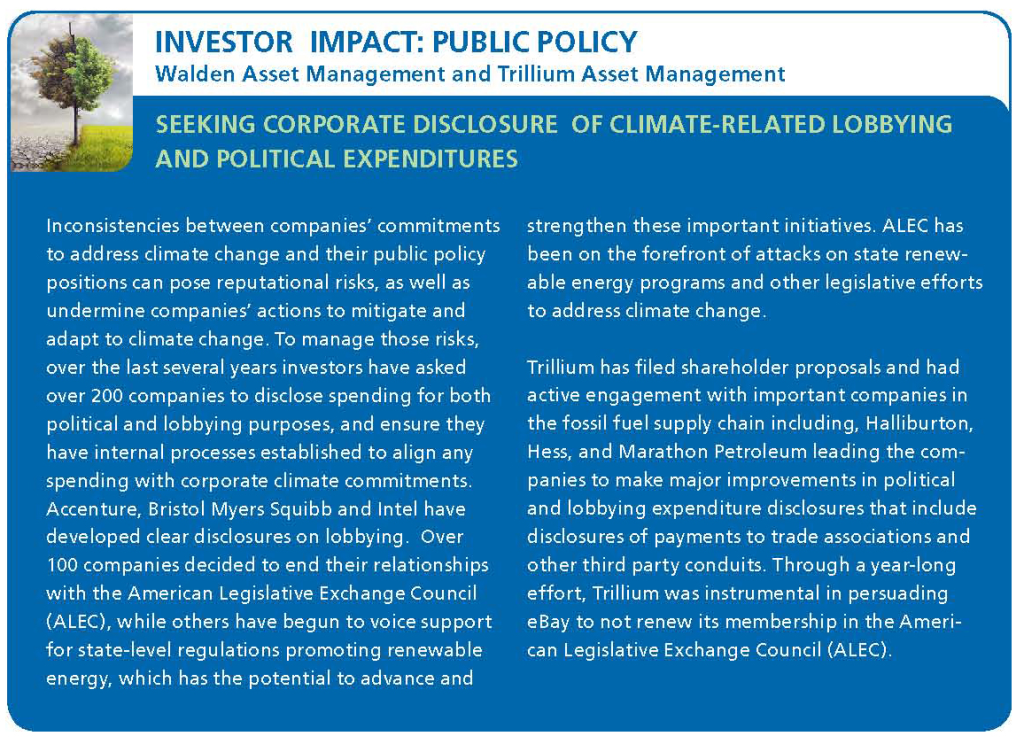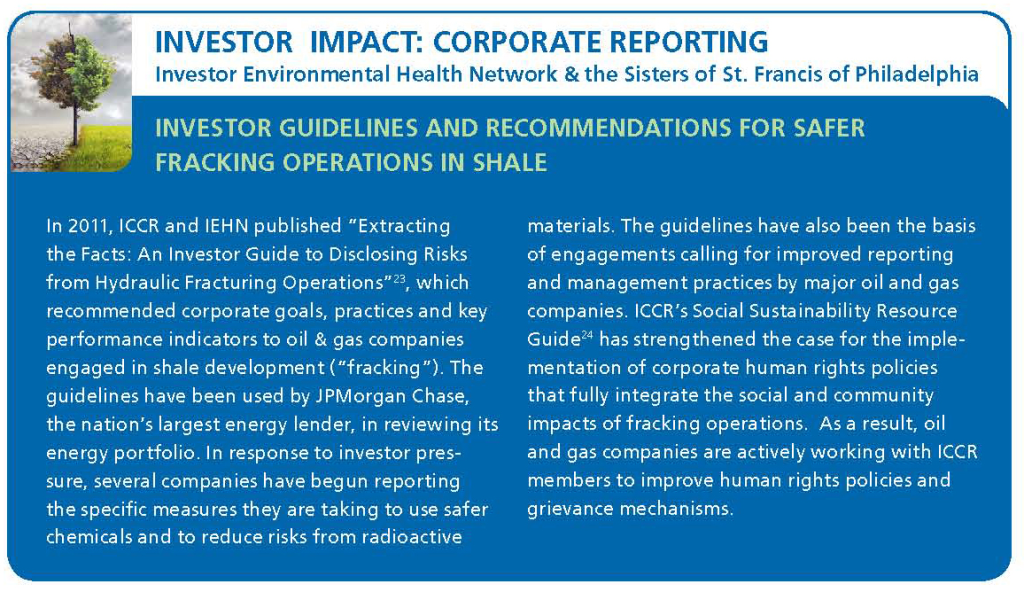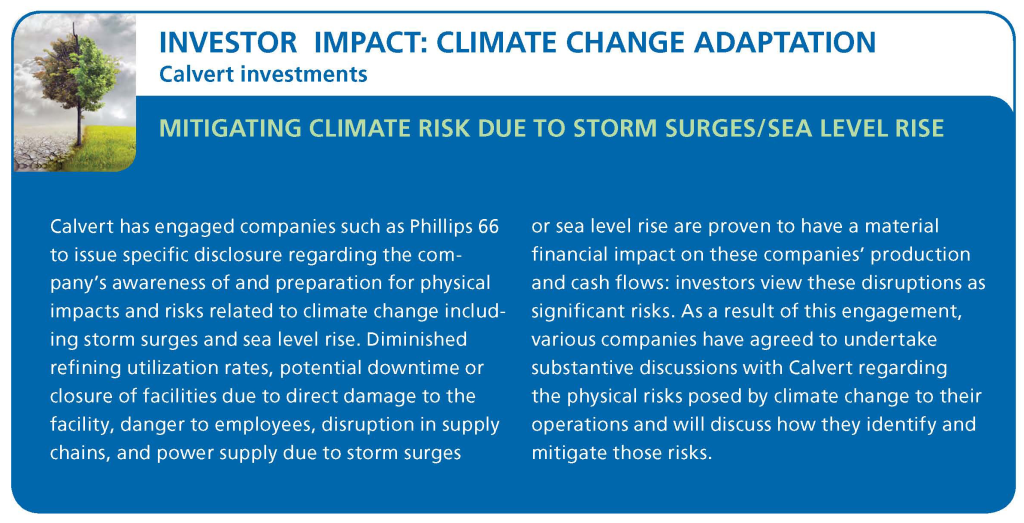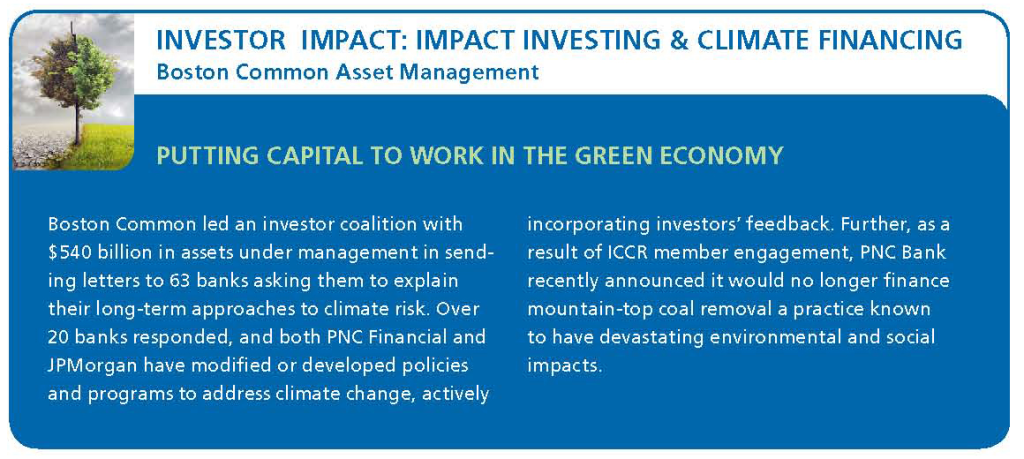An Excerpt of Invested in Change: Faith Consistent Investing in a Climate-Challenged World Published by the Interfaith Center on Corporate Responsibility in April of 2015
To read the full paper, including endnotes and a list of resources, click here
As an organization that for over four decades has advocated that social and environmental justice issues can be influenced through active ownership of stock and direct engagement with corporate leadership by shareholders, the Interfaith Center on Corporate Responsibility (ICCR) believes it is critical that all investors thoughtfully consider their role in responding to climate change.
ICCR’s coalition is largely comprised of the investment arms of some of the largest faith-based institutions. These institutions have investment guidelines that are rooted in their faith traditions and developed to align with their respective missions. While each institution has social justice and environmental priorities that they strive to address through their respective ministries, there are many issues where our membership’s interests intersect: action on climate change is one such issue.
Among virtually all faith groups is a universal call to be in right relationship with the earth, to act as responsible stewards of the planet, and to preserve its health and resources for future generations. With a missionary presence and faith-based relationships in the world’s most vulnerable communities, faith institutions recognize climate change’s potential to exacerbate the suffering caused by extreme poverty and inequality which are at the root of so many existing social justice issues. Risks to land, food and water security, forced migration, global health and human rights—perennial challenges religious groups are addressing in vulnerable communities worldwide —will all increase along with global temperatures unless mitigation and adaptation measures are taken.
Looking beyond these concerns, however, the responsible investment community also sees the economic prospects presented in transitioning to a low-carbon economy. There is already enormous demand for funding for renewable energy, conservation, and adaptation programs that will build sustainable, climate-resilient businesses and communities. At present, the gap between what exists and what is required to build a sustainable energy future is vast, and forward-looking investors are poised to capitalize on these opportunities.
Clearly there are many roles to be played in this global movement to counter climate change threats and many strategies that can and should be deployed. While others are better-suited to lead more public-facing activist campaigns from the outside, our role is to remain on the inside to build will and urge companies to plan, manage and set the carbon reduction goals necessary to bring about systemic and enduring change, and actively encouraging others in the investment community to join us in this work as they can. We view these inside/outside strategies as complementary and mutually empowering, not at odds with one another.
What is also clear is that investors can no longer afford to be passive about the effects of climate change; they must raise their voices, exercise their right to vote both in and out of the corporate boardroom and use their influence through whatever means possible to accelerate change. This mandate extends beyond the responsible investment community to encompass all investors as well as investment professionals, including analysts and proxy voting services. Shareowners of carbon-intensive companies, like the shareowners of any controversial company or industry, have an extraordinary responsibility to use these stocks to their best advantage. These shareowners must, at absolute minimum, vote their proxies to ensure that they are supporting shareholder proposals that seek to advance climate solutions. They may be called upon to vote on board directors and they should know what the candidates’ positions are on environmental issues and whether they have specific expertise that will help the company transition to low-carbon models.
Institutional investors have additional responsibilities and may want to consider participating with ICCR and other investor coalitions in shareholder campaigns on climate change. Without question, having more of us at the table will only increase our influence.
ICCR’S 2015 Climate Change Strategy
Investors adapt their engagements with companies depending on current business models, disclosures, and impacts. Nearly 200 total shareholder proposals may be filed in any given year on discrete subjects and often multiple resolutions are filed at each company. There are an equal number of dialogues held between ICCR members, management team members, and other relevant stakeholders including NGOs and groups representing impacted communities. In these dialogues, held in person or via conference calls, participants address the integration of ethical, social, and environmental considerations in corporate business plans on a more holistic level. Discussions related to climate change are included in approximately one-third of all corporate dialogues held each year.
- Climate Change Mitigation
These engagements call for the measurement, disclosure, and reduction of GHG emissions including setting quantifiable, specific, science-based and time-bound reduction targets. That is, GHG reduction targets are placed within the larger context of the emissions reductions necessary to meet the maximum 2 degrees Celsius global temperature increase. Other proposals have focused on carbon asset risk or the funding of new fossil fuel exploration in light of potential climate regulation. Many companies, including the top five U.S. oil companies, recognize the risk and opportunities associated with climate change and are taking action, including integrating carbon pricing into their business plans as they assess the economic viability of projects.
- Public Policy
Our members maintain that in disclosing lobbying and political spending activities, including spending through third party associations and memberships, companies and investors can ensure that these activities are in alignment with corporate policies on environmental concerns. Members Walden Asset Management and Calvert Investments have published a Policy Engagement Toolkit.
- Corporate Reporting and Accountability
Disclosure is a powerful tool to drive performance improvements and accountability and ICCR members continue to press companies for increased disclosure related to climate change. Through the CDP (discussed below) climate survey, members ask companies to disclose their carbon emissions, the risks and opportunities associated with climate change, as well as the governance structures established within companies to address these risks. Additional, more specific disclosure requests have been developed for industries such as oil and gas and banks. ICCR members also supported work led by Ceres and the Environmental Defense Fund (EDF) in 2010 that led the Securities and Exchange Commission (SEC) to issue interpretive guidance regarding company disclosure of climate risk in 10-K filings.
- Climate Change Adaptation
These engagements request formal climate risk assessments and management plans that will help companies and investors assess climate change impacts to companies’ direct operations as well as throughout their supply chains. Members press companies to develop proactive plans to address potential climate change impacts such as storms or droughts in order to prevent operational disruption and to ensure sustained financial performance.
- ICCR’s Advocacy and Climate Finance Initiatives
A key barrier for shareholders pressing for corporate climate reform as well as investors interested in the climate finance space has been the absence of strong public policy frameworks that will help propel the shift to a low-carbon future. For that reason, the responsible investment community is continuously advocating for stronger climate-related regulations at the state and federal levels. In addition, members are actively promoting proactive investment or climate finance among our allies in the investment community and in our engagements with the private sector.
Questions and Considerations for Investors in Responding to Climate Change
If you are an institution concerned about climate change, please consider these key questions as you develop/refine your own climate change engagement programs:
- Has your organization assessed the carbon footprint of its portfolio and of its own operations and if so, what plans are in place to remediate/improve carbon efficiencies?
- Does your organization have a formal responsible and sustainable investment policy and does it include specific guidelines that account for the economic, environmental and social risks of high carbon investments and/or climate change?
- Do you have proxy voting policies specifically addressing climate change and do you vote all of your shares?
- If high-carbon footprint companies are held in your institution’s portfolio, are they being actively engaged and, if so, what assessment tools and metrics have been developed to track compliance/performance?
- Do you have criteria to determine if and when an engagement has reached an end, and if so, do you have a policy for determining next steps?
- What avenues are available to your organization to help promote responsible public policy on climate?
- How can your organization best use its influence to catalyze climate action among its peers and across networks and constituents?
- Is impact investing/climate finance being considered by your organization to accelerate the transition to low carbon energy?
- Is there adequate communication and alignment between your institution’s internal investment arms, i.e., Chief Investment Officers, investment committees and/or Board of Directors, and shareholder advocacy staff and external financial consultants/advisors?
- Have you asked your fund managers how they assess their securities holdings for carbon asset-risk exposure and if they ask companies in their portfolios to take action to reduce such risks?
We hope these questions are useful in stimulating productive discussions among the relevant stakeholders of your organization and would greatly appreciate any feedback about how they were used and how they might be improved.
About the Interfaith Center on Corporate Responsibility (ICCR)
Currently celebrating its 44th year, ICCR is the pioneer coalition of active shareholders who view the management of their investments as a catalyst for change. Its 300 member organizations with over $100 billion in AUM have an enduring record of corporate engagement that has demonstrated influence on policies promoting justice and sustainability in the world.


